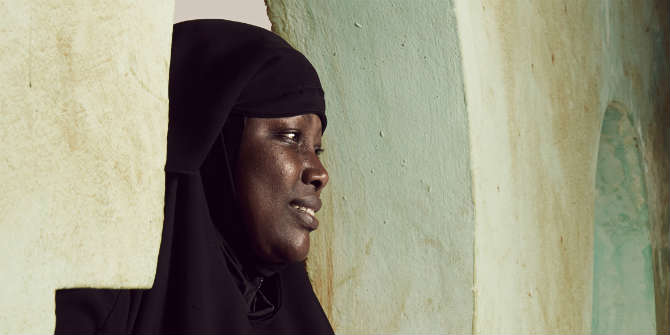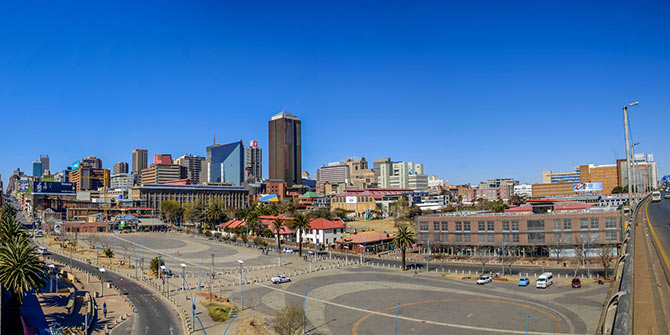Diana Olaleye tells the story behind the famous ‘Ghana Must Go’ bag.
It is chequered. It is sturdy. It is used worldwide. There is some contention as to whether it can be deemed highly fashionable, but it gains some cool points for being waterproof and available in more than one set of colours. For many, it merely serves the primary function which most bags serve – to carry items which may be in large quantities or of large weight especially when travelling. In parts of West Africa, it is known as the ‘Ghana Must Go’ bag.

It is not an ordinary chequered plastic bag but one made of historical and political fabric. This famous ‘migrant bag’ played a significant role in West African history. It was used by several West African citizens, especially Ghanaians, to contain their belongings as they were forced to leave Nigeria during the 1980s — an episode worthy of unrelenting recognition and enduring space in the history books.
A RESTLESS JOURNEY
It began in the early months of 1983 when Shehu Shagari — the Nigerian president at the time — ordered the tragic expulsion of several citizens of the Economic Community of West African States (ECOWAS). Many of them had entered Nigeria as economic migrants during the 1970s without official immigration documents. In the case of Ghanaians, both skilled and unskilled migrants were pushed by the unbearable economic conditions in Ghana to seek refuge in Nigeria, which was widely known as West Africa’s economic utopia at the time.
Being an oil-rich country, Nigeria had been enjoying the benefits of elevated oil prices during the 1970s. With the oil boom came a growth in job opportunities, especially in the services and construction sectors. The notable increase in job opportunities in Nigeria, as well as the existing similarities between the Ghanaian and Nigerian administrative systems¹, appealed to Ghanaians; prompting their relocation to Nigeria in search of better lives. Upon relocating to Nigeria, the Ghanaians worked in different industries: as labourers, traders, artisans, teachers, architects, lawyers and doctors.²
The economic success which befell Nigeria was, however, short-lived due to oil prices plummeting in 1982; therefore causing socio-economic hardships in Nigeria. The highly populous nation began hurting from austerity measures imposed in the hope of stabilising the economy, as urban employment fell drastically, and food shortages became severe. It was then generally believed that the influx of people from neighbouring West African countries instigated the deterioration of economic and social conditions in Nigeria.
THE SCAPEGOATS
The blame game, however, only advanced with the help of Nigerian public officials who exploited the presence of immigrants, and further projected it as the cause of economic decline in Nigeria. With the impending presidential election of August 1983, Nigerian leaders were determined to scapegoat immigrants in an attempt to mask other overpowering causes of Nigeria’s economic failure, including the mismanagement of Oil revenue, corruption as well as high volumes of short term debt and the ‘cement armada’ scheme.
The immigrants were given two weeks to leave Nigeria, lest they be arrested and tried; leading to the exodus of over 2 million immigrants from neighbouring countries. In the process of this displacement, Nigerian police physically harmed immigrants – beating and gassing them, in the hope that they would depart immediately. Many who departed Nigeria were, however, denied entry into other countries – such as Benin Republic – which were also reluctant to deal with an influx of immigrants.
As a result, expelled immigrants were forced to camp in the middle of the borders of Nigeria and Benin, uncertain as to whether they would reach a place they could once again call home. While some Ghanaians were lucky enough to depart Nigeria by air through assistance from the Ghanaian government, others were not fortunate enough to step on Ghanaian soil again as they drowned in severely crowded boats, travelling by sea.
AN EYE FOR AN EYE
Interestingly, the expulsion of Ghanaians from Nigeria in the 1980s could be considered as a punch in the face of the Ghanaian government, in retaliation for expelling Nigerian immigrants in 1969. In November that year, Kofi Abrefa Busia – the-then Prime Minister of Ghana – demanded an expulsion of Nigerian migrants for reasons including economic concerns and xenophobia. While some may deem this irrational, it is, however, difficult to overlook the plausibility of this theory.
This is because several global political events that have occurred recently have shown that politics can be personal, as well as manifest as a game of passions. As we know, experiencing passions can be temporary, yet they often drive actions which may yield enduring results. It can thus not be said with complete certainty whether the wounds felt by both Ghanaians and Nigerians have fully healed; though relations between the two countries have grown, albeit cautiously, in the decades since both cases of expulsion occurred.
POWER AND IDENTITY POLITICS
Undoubtedly, economic factors play a significant role in the dynamics of immigration – be it in enabling migrants access or denying them access – it is not extreme to argue that the displacement of people which stems from unfair immigration policies also boils down to an obsession with national identity³ and, perhaps, the promotion of unequal (power) relations between people from different identity groups. Like most things in the political world, immigration policies can be shaped by unequal power relations.
Referring to Michel Foucault, power can be dual in nature – consisting mainly of juridical and productive elements. What this means is that immigration laws that enable the prohibition of migrants from entering another nation-state are essentially a manifestation of juridical power being exercised. With the productive aspect of power, it can be argued that through unfavourable immigration laws passed, immigrants are also forced to live with constructed and flawed identities – to which they are subjected.
In other words, immigrants are forced to adopt the identity of aliens, unwanted creatures, or burdens. In the case of Ghanaian immigrants in Nigeria, many of them would have had to deal with the painful detachment from friends they made in what they probably imagined as their new home, as well as the flawed and fabricated image of themselves as aliens or ‘economic leeches’. Involuntary relocation is therefore even more difficult to manage alongside the psychological trauma from viewing one’s self as an outsider or a burden.
While identity politics can invoke benefits such as providing people with the opportunity to understand the significance of exercising mutual recognition, it can also be manipulated to produce negative outcomes like xenophobia and the maltreatment of people from different identity groups. Though not as severe as recurrent cases in countries like South Africa, the expulsion of Ghanaians in the 1980s, as with recent happenings, continue to represent a failed intra-African migration.
THE INEVITABILITY OF MIGRATION
Beyond the sub-region of West Africa, members of the global community continue to endure extended periods of extreme political instability, as well as economic and environmental uncertainty. History tells us that when people find themselves in a place where peace, love and prosperity do not reside, they succumb to the pressures of migration – an inevitable phenomenon which we must learn to accept and manage more effectively and equally. It is important for leaders, not just in Africa, but also across the globe, to govern in a manner that prevents forceful relocation, and the ‘othering’ of people of different nationalities.
As some migrants continue to use the ‘Ghana Must Go’ bag in the hope of finding a place of permanent residence, today, they still face barriers. Too often, the hopes and dreams of migrants have soared only to crash into fabricated fortifications. Yet, as Alberto Rios writes in The Border: A Double Sonnet, “the border is mighty, but even the parting of the seas created a path, not a barrier.” And so, in a world shaped by dire uncertainty and constant mobility, one can only hope that there will be more paths created to prevent unwarranted exile and displacement.
This article was first published by The Book Banque.
Diana Olaleye (@Diana_Olaleye) is in her final year of studying for a BA Politics at King’s College London. Though a student of Politics, Diana is interested in African culture, literature and art. She manages a blog called OMO KERIN which is centred on cultural history and art across the globe. She hopes to gain an MA in International Relations and build a successful career in international development.
The views expressed in this post are those of the author and in no way reflect those of the Africa at LSE blog or the London School of Economics and Political Science.
Sources
¹ Nieswand, B. (2011). Theorising Transnational Migration: The Status Paradox of Migration. New York: Routledge.
² Nieswand, B. (2011).
³ Adida., C. (2014). Immigrant Exclusion and Insecurity in Africa: Coethnic Strangers. New York: Cambridge University Press.






History ?repeats itself #BrilliantPiece✍?
Interestingly in Cote d’Ivoire, there’s a similar history, and indeed a similar explanation for the ‘Ghana Must Go’s (also sometimes called ‘Abidjan-Ouaga’). Ivorians will tell you that the name comes from the disturbances around matches between Abidjan-based club ASEC and a Ghanaian football team in the early 90s (I recall the club was something like Kotoko), following which Ghanaians were told to go home. Ivorians have an expression ‘tomber comme Ghana’ (fallen on hard times like Ghana) due to the arrival of Ghanaian migrants in the 60s and 70s, when they were stereo-typically identified with professions like ‘house boys’ and prostitution.
Interesting take on this subject, considering that I lived in Nigeria at this time, and the narrative was different, I never heard of the sea deaths. I knew definitely that a lot of people travelled by road and the bags have gained popularity over the years even featured in a popular fashion designer’s collection in luxury stores in the UK in recent years.